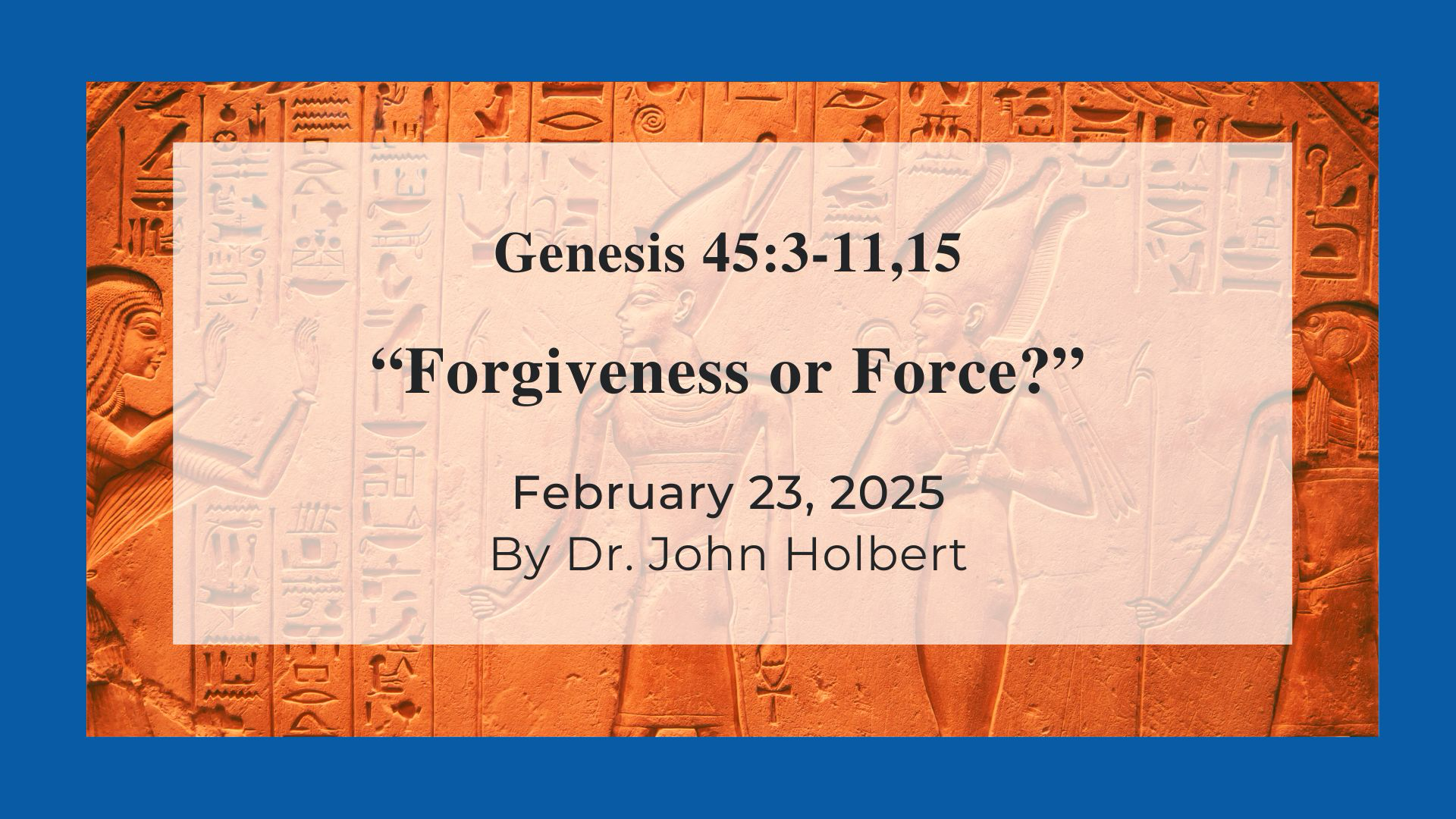Forgiveness or Force? Reflections on Genesis 45:3-11, 15 for Epiphany 7, Year C
by John C. Holbert on Friday, January 24, 2025

Genesis 45 has long been a favorite text for preachers ever on the lookout for Bible stories that appear to present scenes of rich forgiveness and familial harmony. The tale has regularly been presented as a touching account of Joseph’s forgiveness of his murderous brothers, who earlier in the story, had tossed their hated sibling into a well, had lied to their father about his supposed death, employing a bloody coat, that infamous long-sleeved coat given by Jacob to his favorite son, Joseph, to deceive the old man, but who subsequently had been driven by hunger to seek food in Egypt. In the interim, their brother, presumed long dead, had become one of Egypt’s most powerful figures, the very right hand of the pharaoh himself. As the desperate Israelite brothers begged for aid from a powerful Egyptian official, they could hardly have known that this very official was none other than their brother, whom they imagined dead, but who instead had become massively great in Egypt.
Joseph’s language in the scene sounds wonderfully warm, gracious, and deeply theological. “I am your brother, Joseph, whom you sold into Egypt. Now do not be upset, or angry at yourselves that you sold me here, because Elohim sent me ahead of you to bring life” (Gen.45: 4-5). “It really was not you who sent me here, but Elohim who has made me father to pharaoh, master of his household, and ruler over the whole land of Egypt” (Gen.45:8). So, my brothers, says the magnanimous Joseph, all is forgiven! You wanted me dead, but God wanted me alive to serve as a savior for you and as nothing less than the monarch over the vast and powerful land of Egypt. Joseph will repeat these astonishing claims in Gen.50:20: “Though you intended evil for me, Elohim intended good, in order to preserve this day a vast people.” Joseph appears both forgiving and theologically astute, and has thus served for centuries as a model of profound and lasting superior human behavior.
Given the other tales of the book of Genesis that include the self-serving Abram/Abraham, the clever Isaac, and the wily and deceptive Jacob, I am dubious that the narrators of these ancient tales would so suddenly offer to us the very model of righteous behavior. And a more careful reading of the story suggests to me that my concern is not without merit. Joseph is not, in fact, free of the self-serving traits of his forebears, not devoid of the grand arrogance of those patriarchs who came before him. An even cursory reading of the chapters that precede Gen. 45, should make any of us aware of the deeper complexity of this man, however great he may be in Egypt, and however magnanimous his words to his brothers sound.
When his brothers first appear before the disguised Joseph, desperately seeking food aid for themselves and their starving father and youngest brother Benjamin back in Egypt, Joseph recognizes them immediately but they, of course, do not see in this potent Egyptian any trace of their lost brother (Gen.42:8). Joseph’s initial response to the band of brothers is hardly magnanimous. “You are spies,” he shouts at them. “You have come to see the defenses of the land!” (Gen.42:9). And after that cruel and completely ridiculous accusation, this same Joseph begins a long and horrifying series of games with his brothers, lasting over the next three chapters, right up to his final revelation of his identity to them in Gen.45. He first demands that they leave their youngest brother with him, imprisoned, while they return to Canaan to prove that they are not spies. He then takes their money for the food, but puts all the cash back in their sacks, forcing them to return to Egypt, whereupon he says they are thieves! Finally, he demands that they bring back the youngest boy, Benjamin, when they return to Egypt. But when they do, he hides his notorious divining cup in Benjamin’s sack, and once again accuses them all of theft. He over many months of their travels back and forth from Egypt to Canaan plays them like puppets, apparently enjoying each new game. Thus, I would argue that his ultimate self-revelation in Gen.45 is far less open and forgiving than merely an ending to his appalling games of revenge against them. Joseph in this light is not the pure and wonderful man of forgiveness but rather more a man like all others of his patriarchal predecessors, deeply flawed and immensely complex in motive and action.
In addition, I might suggest that what he actually says to his brothers when he reveals himself to them is not as simple as it first may sound. After all, his claim to be “father to pharaoh” and “ruler over the whole land of Egypt,” is wildly exaggerated, the clear boasting of one who now wields power over those who earlier thought they had disposed of him in the desert. Those out for revenge are prone to such absurd claims as they act out their imaginative actions of getting even. Given all those details—and many more could be added—a preacher should be very careful in holding Joseph up as a paragon of righteousness and forgiveness. Jeremiah’s evaluation of human behavior remains crucial as we confront any human story: “The heart (the will and intention) is devious beyond everything else” (Jer.17:9) Truer words never were spoken.
